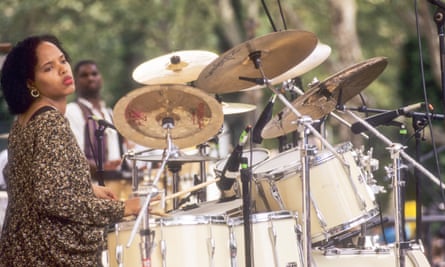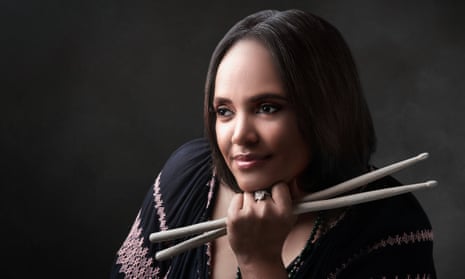Imagine for a moment that you are a jazz musician looking for a standard to master – one of those timeless songs widely accepted as the backbone of the genre. You flick through The Real Book for inspiration – the best-selling jazz songbook of all time, with its distinctive peachy cover. There is music by Duke Ellington, Dizzy Gillespie, John Coltrane, Herbie Hancock, the late Chick Corea – untold greats. But scanning its 400 songs, something seems off: only one of these jazz standards is written by a woman.
Grammy-winning drummer Terri Lyne Carrington knew this wasn’t the full picture. The Real Book has Ann Ronell’s Willow Weep for Me and some songs attributed to Billie Holiday, she says, but it overlooks the countless women who made jazz history. Carrington is also a professor at Berklee College of Music, where the first Real Book was devised in the 1970s. Her upcoming project, New Standards, is a corrective: a sheet book of jazz compositions written entirely by women. In addition, she selected 11 to record for a studio album, joined by guests including Ravi Coltrane (son of John and Alice), singer and flautist Melanie Charles and avant-garde trumpeter Ambrose Akinmusirie (and it will be rounded off by a multimedia exhibition at Detroit’s Carr Center). “Geniuses,” Carrington stresses. “Women don’t get called that enough.”
A drummer for more than 40 years, Carrington has worked with everyone from Hancock to Wayne Shorter, Stan Getz, Teena Marie and Ela Minus. New Standards also underlines her skill as a curator, bringing together 101 composers from across continents and different eras. There are American virtuosos (harpists Dorothy Ashby and Alice Coltrane, trombonist Melba Liston, avant-garde pianist Carla Bley – whose former husband, Paul, was in the original book); two Latin-American contemporaries, Brazilian jazz-pianist Eliane Elias and Chilean saxophonist Patricia Zárate Pérez; and “unknowns” such as Sara Cassey, a Detroit pianist whose compositions were played by male greats such as Thelonious Monk and Gene Krupa while she remained in the wings.
The new generation feature, too: among them, New York City harpist Brandee Younger, London saxophonist Nubya Garcia, and Jaimie Branch, a dynamic player on progressive Chicago label International Anthem who died in August, aged 39. “She played the heck out of the trumpet,” Carrington says of Branch. “And her personality shines through in her graphic scores – being a renegade, making people think. It’s a huge loss.”
Like Branch, the composers on New Standards have eschewed conventional jazz structures and pushed the form forward. While traditionally it has been men portrayed as innovators, these women are mavericks in their own right. Zooming from her home in Boston, Carrington motions to her T-shirt, which bears the slogan of one of her gender-balancing initiatives: Jazz Without Patriarchy. “When you think in those equitable terms, women would be visionaries just like men.”
Only two people declined to be involved, she says, because “they don’t feel that women should be separate”. But, reasons Carrington, “there’s nothing wrong with celebrating women without it suggesting that women should be siloed”.

Carrington grew up aware that “there weren’t other little girls like me”. A child prodigy born into a family of drummers, she was 10 when flugelhorn player Clark Terry took her to the Wichita jazz festival as his special guest, and 11 when she was offered a scholarship to Berklee – after none other than Ella Fitzgerald had insisted that the school president watch the young drummer play.
Earlier in her 40-year career, Carrington declined to play on all-women lineups. That changed with her sixth album, 2011’s The Mosaic Project, where she assembled a group of heavyweights including Esperanza Spalding, Dee Dee Bridgewater, Nona Hendryx and Sheila E. Despite its gale-force brilliance, Carrington says major labels initially turned it down as she struggled to be accepted as a drummer-turned-bandleader. “The comments I got back were: I was too ambitious, I was never going to make a good leader. Even though we, of course, have Art Blakey, Max Roach, Elvin Jones …”
At that time, many of the big jazz labels “had not signed many women instrumentalists, just a few piano players”, she says. “There was no effort [to change that]. When I look back at it, it was the same narrative: women sing jazz and men play it.” She eventually signed The Mosaic Project with the independent Concord Jazz: it went on to win a Grammy.
New Standards arrives after that gender disparity has come into sharper focus. There are various alarming statistics about the comparative lack of women in jazz, especially as instrumentalists: a 2019 UK study found that only 19% of jazz artist rosters were women, while 26% were solo artists, compared to 8% in groups. In the US, NPR concluded that from 2017-2019, the majority of recordings ranked in their annual jazz critics poll “included no women musicians at all among their core personnel”.
But since the #MeToo movement, says Carrington, “there’s definitely been a shift in consciousness” – including her own – and various moves to address the imbalance. “We’re at a stage in society where women are saying: no more.”

Berklee had its own reckoning in 2017 when an exposé alleged a prolonged history of sexual misconduct at the school. Not long after, Carrington started the Berklee Institute of Jazz and Gender Justice. “I started listening to a lot of the young women,” she says, “and feeling like: ‘Wow, I’m part of the problem if I’m not trying to be part of the solution.’” The programme offers opportunities for women and non-binary musicians “to learn the music without the extra burdens that can come with being in male-dominated space”.
In jazz, that space means that as a woman, “you have to fit in in a certain way; you can’t be too feminine or too masculine”, says Carrington, which is exhausting to navigate before you’ve even picked up your instrument. And a couple of students told Carrington that they realised they were toughening up “because they didn’t want to get hit on”.
Then there are just plain old sexist generalisations to contend with. In 2017, the American musician Robert Glasper claimed that women “don’t love a whole lot of soloing” in jazz and likened getting in the groove – which women apparently much prefer – to finding a “musical clitoris”. He has since apologised for his remarks. Carrington stepped in. “I called him to talk to him about it,” she says, adding that he took her points on board.
“I don’t even blame these guys for the language they use and their point of view because they’ve been enabled for so long,” she continues. “I blame the system and structures beyond individuals. If your whole life you’ve been told this is what reality is, this is what’s acceptable behaviour, then we just have to educate each other. I don’t even get mad any more. I just shake my head and say: OK, there’s more work to do.”
Carrington has certainly got her work cut out. She points to affirmative action, hiring outside one’s social circle and handing school-age girls instruments instead of microphones as ways to help undo gender bias. Alongside New Standards, she is also launching Next Jazz Legacy, a major three-year mentorship scheme for women and non-binary musicians with the aim of making American jazz more inclusive. “Unknown territory can be uncomfortable,” she concludes, “but things have changed and are changing.”
New Standards Vol 1 is released on 16 September on Candid Records.
